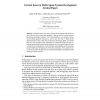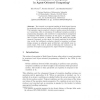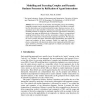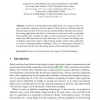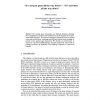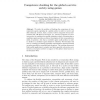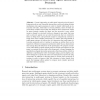ESAW
2006
Springer
14 years 3 months ago
2006
Springer
Abstract. This paper surveys the state-of-the-art in developing multi-agent systems, and sets out to answer the questions: "what are the key current issues in developing multi...
ESAW
2006
Springer
14 years 3 months ago
2006
Springer
The research on exception handling in Multi-Agent Systems has produced some advanced models to deal with `exceptional situations'. The expression `agent exception' is how...
ESAW
2006
Springer
14 years 3 months ago
2006
Springer
The use of norms is a well-known technique of co-ordination in multi-agent systems (MAS) adopted from human societies. A normative position is the "social burden" associa...
ESAW
2006
Springer
14 years 3 months ago
2006
Springer
Interaction refers to an abstract and intangible concept. In modelling, intangible concepts can be embodied and made explicit. This allows to manipulate the abstractions and to bui...
ESAW
2006
Springer
14 years 3 months ago
2006
Springer
Abstract. In all user-centred agent-based applications, for instance in the context of ambient computing, the user agent is often faced to a difficult trade-off between the protect...
ESAW
2006
Springer
14 years 3 months ago
2006
Springer
The rational agent community uses Michael Bratman's planning theory of intention as its theoretical foundation for the development of its agentoriented BDI languages. We prese...
ESAW
2006
Springer
14 years 3 months ago
2006
Springer
Electronic institutions (EIs) have been proposed as a means of regulating open agent societies. EIs define the rules of the game in agent societies by fixing what agents are permit...
ESAW
2006
Springer
14 years 3 months ago
2006
Springer
Abstract. We study the problem of checking the competence of communicative agents operating in a global society in order to receive and offer electronic services. Such a society wi...
ESAW
2006
Springer
14 years 3 months ago
2006
Springer
Abstract. Current approaches to multi-agent interaction involve specifying protocols as sets of possible interactions, and hard-coding decision mechanisms into agent programs in or...
ESAW
2006
Springer
14 years 3 months ago
2006
Springer
